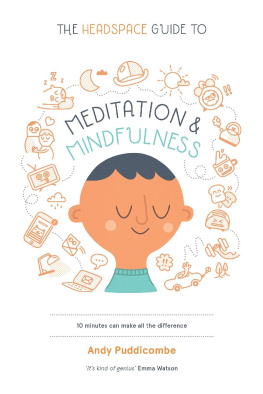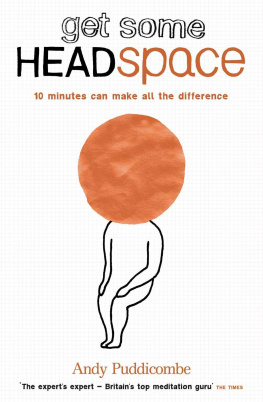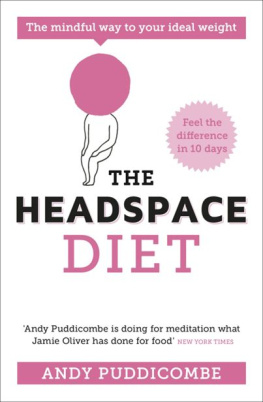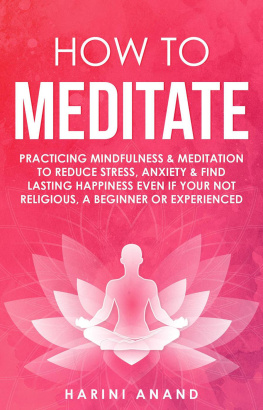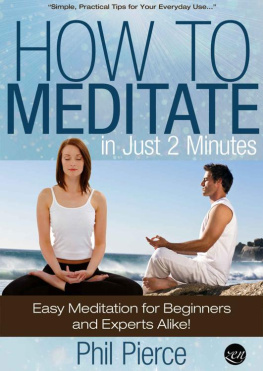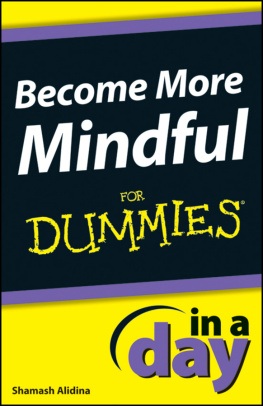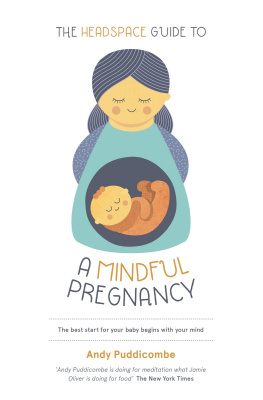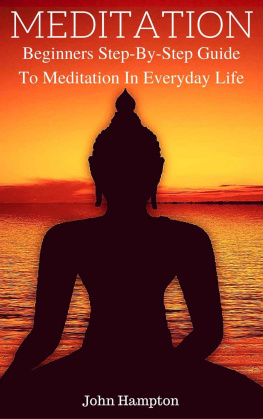
Thank you for buying this
St. Martins Press ebook.
To receive special offers, bonus content,
and info on new releases and other great reads,
sign up for our newsletters.


Or visit us online at
us.macmillan.com/newslettersignup
For email updates on the author, click here.
The author and publisher have provided this e-book to you for your personal use only. You may not make this e-book publicly available in any way. Copyright infringement is against the law. If you believe the copy of this e-book you are reading infringes on the authors copyright, please notify the publisher at: us.macmillanusa.com/piracy.
There are lots of people Id like to thank for helping to make this project a reality, but first and foremost are the meditation masters who Ive had the good fortune of studying with in monasteries and retreat centers around the world. Without the teachings from these remarkable individuals and the meditation traditions they embody, this book would have been impossible to write. Id especially like to thank Donal Creedon for his guidance, kindness and invaluable friendship over the years.
Id also like to thank my editor, Hannah Black, and the entire team at Hodder & Stoughton, for making this such an enjoyable process. Also to Antony Topping at Greene and Heaton, and Rich Pierson and Maria Schonfeld at Headspace, for casting a critical eye over so much unedited work and for all their helpful suggestions. And finally to Nick Begley for his valuable contribution to the scientific research sections of this book.
Id like to add a special note of thanks to Ian Pierson, Misha Abramov and Marcus Cooper for their kind and generous support of the Headspace project. On behalf of all at Headspace, we simply cant thank you enough.
And last, but by no means least, Id like to thank my family and friends for their enthusiastic support of this book and the entire Headspace project. In particular Id like to thank my partner, Lucinda Insall-Jones, for her love, patience and unshakable faith in all that I do. It means the world to me.
It was already well past midnight. I sat on top of the wall and looked down. The tall pine trees from inside the grounds gave me plenty of cover in the darkness, yet I couldnt resist the urge to look back one last time to see if Id been followed. How had it come to this? I looked down again. It was just over twelve feet to the pavement. It may not sound that high but, crouching in a flimsy pair of sandals and my night clothes, the thought of jumping made me wince. What was I thinking wearing sandals? Id tucked them into my trouser bottoms as I crept through the monastery, trying not to wake any of the other monks. Id gone to the monastery to contemplate life, and yet here I was scaling its walls and contemplating my sandals as I prepared to jump back into the world.
It was never meant to be this way. Id trained as a Buddhist monk before, and in much more challenging environments. But other monasteries had exuded a warmth, a kind and caring approach to what can only be described as a challenging, yet very fulfilling, way of life. This one had felt different though. It was a Buddhist monastery like no other. Locked in, day and night, surrounded by high stone walls and with no way of contacting anyone on the outside, at times it had felt more like a prison. I had no one to blame but myself of course, after all Id gone there of my own free will. Its just that traditionally monasticism is a little different from the Mafia. Its not usually the case that once you become a monk, thats it, for life, with no way out. In fact on the contrary, Buddhist monasteries are known and respected for their tolerance and compassion. So how Id ended up leaving over a twelve-foot wall to get away from one was a mystery really.
It had all started a few years earlier, when I made the decision to pack up and head off to Asia to become a monk. I was at university at the time, studying Sports Science. It may sound like a dramatic change in lifestyle, but it felt like one of the easiest decisions Id ever made. Understandably, my friends and family were slightly more apprehensive than I was, perhaps wondering if Id finally lost my mind, but all of them were none the less supportive. It was a different story at university, however. On hearing the news, my head of year suggested that a trip to see the doctor for some Prozac might be a more sensible option. As well meaning as he might have been, I couldnt help thinking he was missing the point. Did he really think I was going to find the type of happiness and fulfillment I was after in a bottle of prescription medicine? As I walked out the door of his office he said, Andy, youll regret this decision for the rest of your life. As it turns out, it happens to be one of the best decisions Ive ever made.
Now you may be wondering what kind of person suddenly decides one day to head off to Asia and become a Buddhist monk. Perhaps youre imagining a self-medicating student whod lost his way, or a creative type with the desire to rebel against a consumerist society. But the reality was actually far more mundane. At the time I just really struggled with my mind. Not in a straightjacket kind of way you understand, but I struggled with the endless thinking. It felt as if my mind was permanently switched on, going round and round like a washing machine. Some of the thoughts I liked. A lot of the thoughts I didnt like. The same was true of the emotions. As if a busy head wasnt enough, I felt as though I was always drifting into unnecessary worry, frustration and sadness. They were quite ordinary levels of emotion, but they had a tendency to spin out of control every now and then. And when they did, there was nothing I could do about it. It felt as though I was at the mercy of these feelings and would get blown around by them. On a good day, everything was fine. But on a bad day, it felt like my head would explode.
Given the strength of feeling, the desire to train the mind was never far from my thoughts. I had no idea how to do it properly, but Id come into contact with meditation at a very early age and knew that it offered a potential solution. Now I wouldnt want you to think that I was some kind of child prodigy, and spent my teenage years sitting cross-legged on the floor, because thats most definitely not the case. I didnt take up the full-time study of meditation until I was twenty-two, but my first moment of headspace that I experienced at the age of eleven most definitely became a marker for what was possible. Id love to say that it was a yearning to understand the meaning of life that motivated me to sign up for that first meditation class, but the truth is I went because I didnt want to feel left out. My parents had just separated and, looking for a way to cope, Mum had signed up for a six-week course. Seeing as my sister was going, I asked if I could go along too.
I guess I just got lucky the first time I tried it. I didnt have any expectations, so couldnt project any hopes or fears on the experience. Even at that age its hard to ignore the change in the quality of mind that meditation can bring about. Im not sure Id ever experienced a quiet mind before then. Id certainly never sat still in one place for such a long period of time. The problem of course was when I didnt get the same experience the next time I tried, or the time after that, I started to get very frustrated. In fact, it was as if the harder I tried to relax, the further I moved away from a place of relaxation. So this was how my meditation began, battling with my mind and getting increasingly frustrated.
Next page
